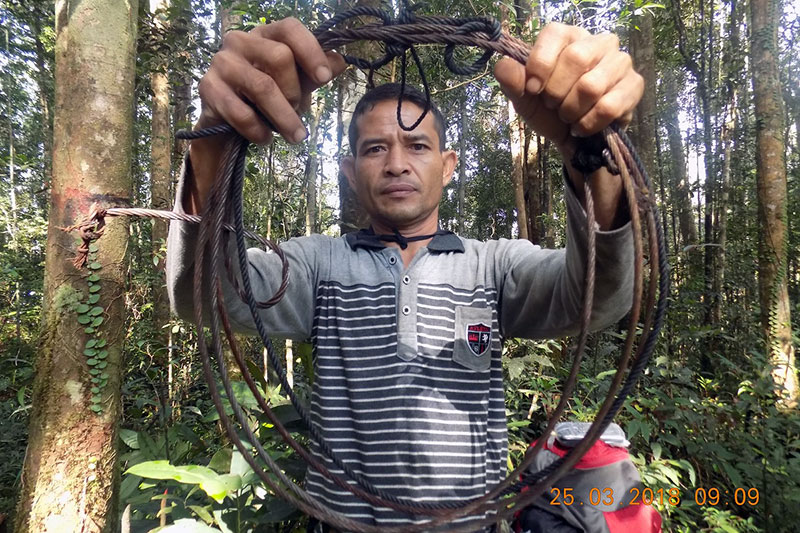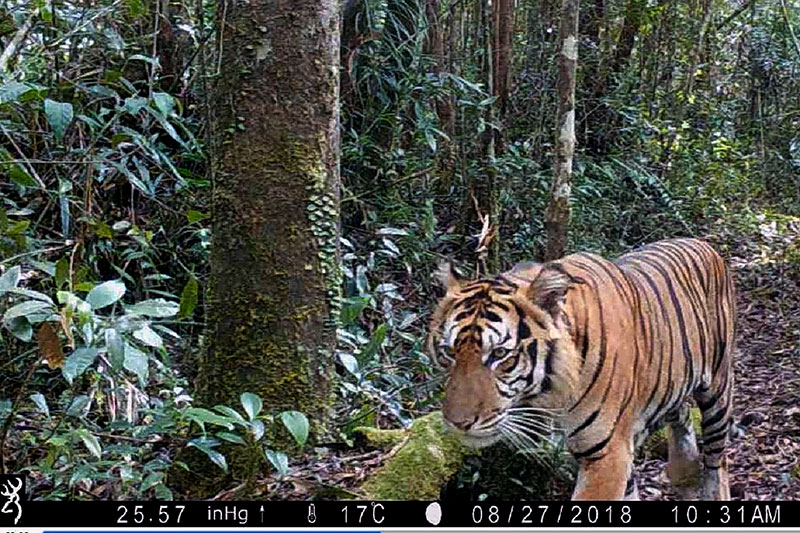In the past 50 years, Mother Earth has lost two-thirds of her precious wildlife.
We busy, greedy humans are to blame.
However, we can also be part of the solution to mitigate this heartbreaking trajectory we are on. It will take decades for endangered species numbers to return to an acceptable level but as a collective, we can make a difference.
The fate of the Sumatran tigers is in our hands
With less than 400 left living in the wild in Sumatra, Indonesia, they are now listed as Critically Endangered. Sadly, we humans failed the Balinese and Javanese tigers who were pushed to extinction in the 1900s mainly through devastation of their habitat, poaching and traps. We call it the Human -Tiger Conflict. The reality is tigers like so many other innocent species in the wild are not able to compete with greedy humans and unless we drastically change our ways and our demands on our natural resources, these majestic animals will become just mere pictures in books or Wikipedia pages.
Unfortunately for tigers, poaching alongside corruption is still rife despite being illegal under the Convention on International Trade in Endangered Species. The illegal trade for wildlife is worth billions on the black market. With a lack of law enforcement and weak penalties for poachers despite being a protected species in Indonesia, tigers and other endangered wildlife remain at risk.
A global problem we have is the decimation of our natural rainforests
We can no longer turn a blind eye
“This is the fastest, most comprehensive transformation of an entire landscape that has ever taken place anywhere in the world including the Amazon. If it continues at this rate all that will be left in 10 years is a few fragmented areas of natural forest surrounded by huge man-made plantations. There will be increased floods, fires and droughts, but no animals,” said Yuyun Indradi, political forest campaigner with Greenpeace south-east Asia in Jakarta.
As we greedy humans slowly strangle the life out of essential rainforests, the Sumatran tigers’ homeland is destroyed forcing them to encroach on village dwellings to hunt, roam and source food, often in the form of livestock. These innocent big cats are often met with retaliation killings.
Snares are placed throughout the rainforest to capture deer and pigs. Sadly, the tigers are also victims of this practise and often die a slow, painful death from infection. If a mother has been caught, then little hope is left for the survival of her cubs that are born blind and need her for the first six months of their lives.
International Tiger Project (ITP)
The International Tiger Project (ITP) is a non-for-profit project for tiger conservation, rainforest protection and partnerships with the local community to help protect and save the entire ecosystem and biodiversity of habitats shared by tigers. Their vision is that all tigers live in the wild in secure and viable populations. In order to help them achieve their vision, we fully support the ITP through our Rewards4Earth™ Foundation Endangered Species Mandate. We are determined not to see the Sumatran tiger end up like their extinct cousins – a lot more can and must be done with your help.
The ITP has set up Wild Protection Units (WPU) which are committed to monitoring, preserving and protecting this valuable land. They have dedicated anti-poaching patrols, wildlife monitoring and human–wildlife mitigation systems in place.


The WPU patrol work alongside local communities to educate them but also ensure tigers and humans co-exist in harmony. The local communities who live and work on the land are also suffering as their land is swallowed up by large corporate conglomerates. Together the WPU and the locals work side by side to collect information on illegal activities, wildlife tracks and sightings. The Ecosystem Monitoring Units have multiple camera traps. In order to correctly identify each tiger and monitor their movements, the tigers need to be filmed on both flanks to identify their markings. The traps themselves are expensive and need heavy duty chains and locks so they are not stolen. Nothing is safe from greedy humans – it really is a jungle out there! As well as using their advanced camera tracking, the foot patrols focus on the detection of, and more importantly, the prevention of poaching. The teams patrol at least 15,000 hectares every month to uncover any evidence of illegal activities and to collect wildlife distribution data. On their travels, snares are deactivated and illegal activity is reported to the field office and passed on to law enforcement.
By providing such thorough data via their tracking methods, the ITP objectives have a positive knock-on effect to not only protect and preserve tiger numbers, but also other endangered species in the region by ensuring the rainforest is a safe haven and all who live under its majestic canape are able to thrive.
With the COVID-19 pandemic shifting our focus from the environmental movements to our own mortality, it is vital we do not turn our back on the planet and all species we are fortunate to share it with.
You can help by being part of the solution to help us Save the Planet. Please click here.

We help through
Erth ™
Loyalty Marketing Reward Points,
Where Planet Earth can Benefit from Every Sale made to Every Customer from Every Business on the Planet.
Sources: WWF – Endangered species threatened by unsustainable palm oil production, The Guardian -The Sumatran rainforest will mostly disappear within 20 years, NPR – The World Lost Two-Thirds Of Its Wildlife In 50 Years. We Are to Blame, Smithsonian Magazine – Humans Wiped Out Two-Thirds of the World’s Wildlife in 50 Years, ABC News – Poaching and deforestation is pushing Sumatran tigers to the brink of destruction

